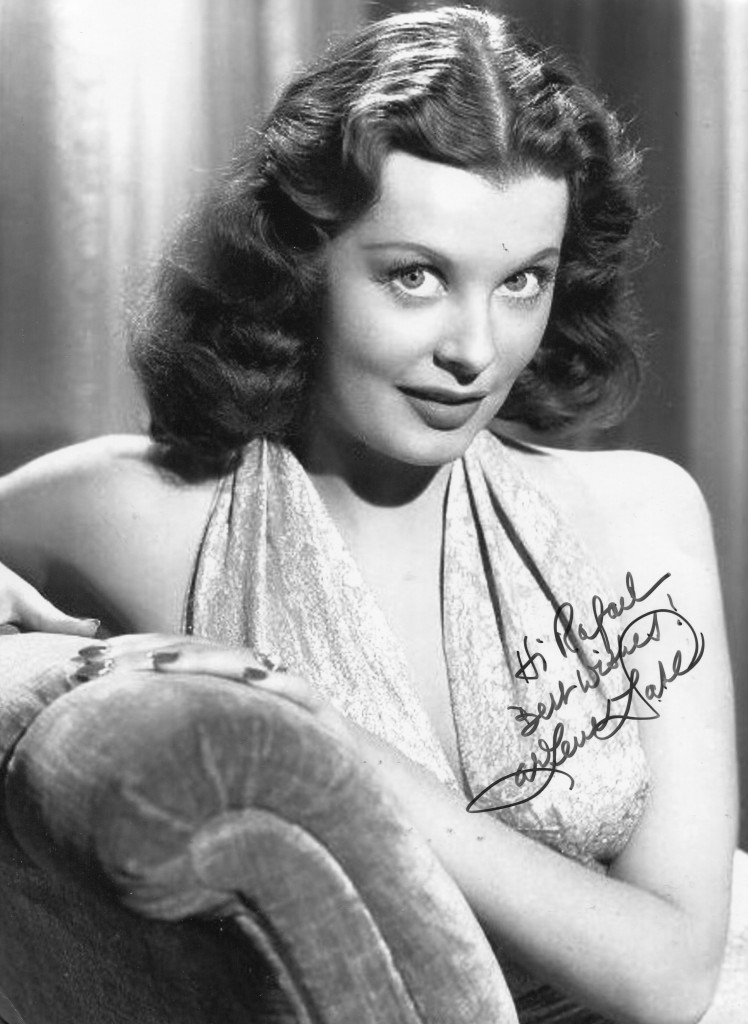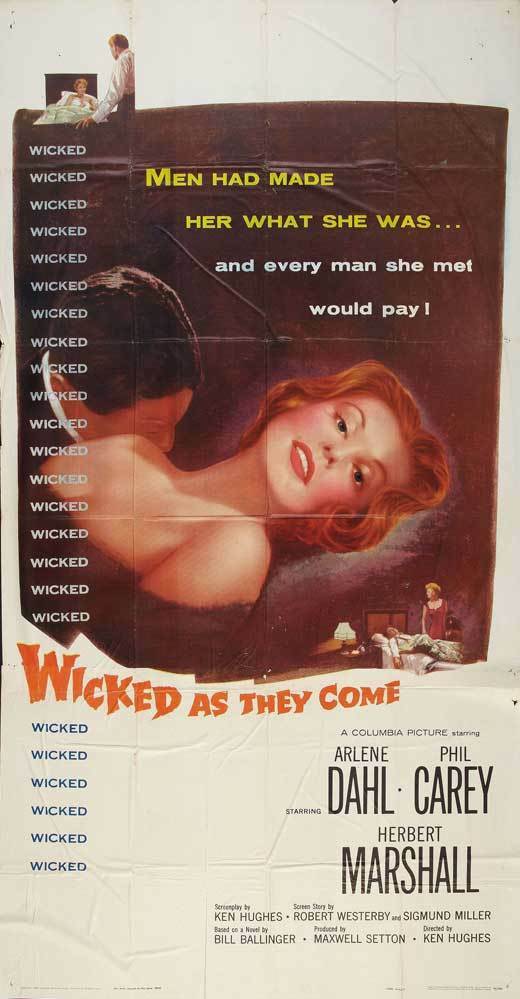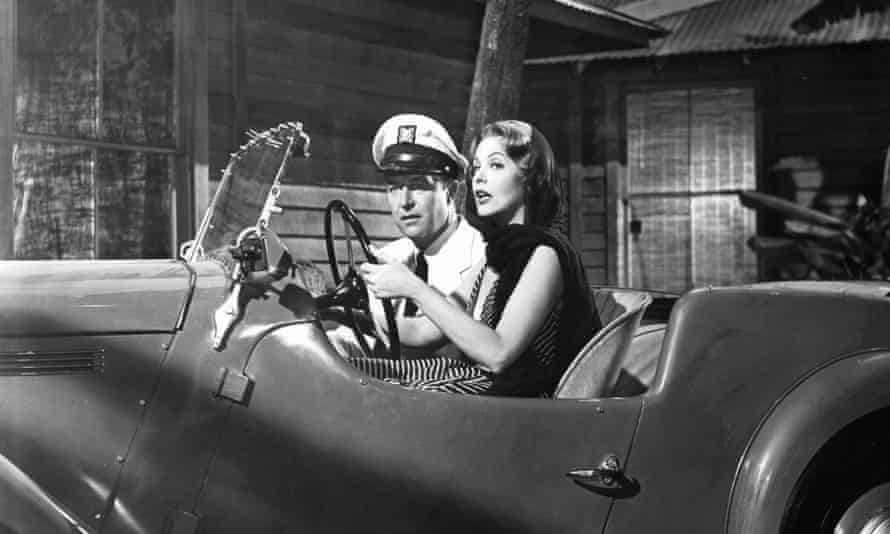


Arlene Dahl. TCM Overview
Beautiful Arlene Dahl was one of the most attractive actresses on screen in the 1940’s and 50’s. She was born in 1928 in Minneapolis of Norwegian. Her first film was in 1947 “Life with Father” and then she had the lead role in “My Wild Irish Rose”. Among her other films are “Three Little Words” and “Journey to the Centre of the Earth”. Article on Arlene Dahl here.
TCM Overview:
With her lush red hair and signature beauty mark, Arlene Dahl joined the court of MGM royalty in late 1940s and early 1950s, soon becoming more an icon of womanly elegance than of thespian prowess. A Minnesota native, Dahl followed the standard pattern of fresh-scrubbed, Midwestern girl-makes-it-big, whose ravishing looks and curvaceous figure vaulted her from beer advertising to the silver screen almost overnight. Paired early in films with Red Skelton and Van Johnson, she largely played the role of eye-candy, often in color-filmed adventures and fluffy comedies. She distinguished herself more in smaller films with more textured roles, including as a vampy French conspirator in “Reign of Terror” (1949) and a felonious temptress in “Slightly Scarlet” (1956).
The limelight fell on her personal life as well, via celebrity couplings with “Tarzan” Lex Barker and “Latin Lover” Fernando Lamas, both tempestuous unions and the first of her many marriages. A colorful sci-fi splash in “Journey to the Center of the Earth” (1959) signified the apex of her film career, but she had already established a plan B as a beauty and fashion maven via a syndicated newspaper column, which she would expand into a book series and a lucrative career in advertising and the beauty products industry.

















After going bankrupt in the early 1970s, Dahl returned to show business for a smattering of television projects, highlighted by a three-year stint on the soap opera, “One Life to Live” (ABC, 1968- ), and would reinvent herself again as a celebrity astrologer. She wound down her screen career with intermittent appearances in projects starring her son, Lorenzo Lamas. A star of stage, screen and business, Dahl turned her relatively short stint as the toast of Hollywood into a launch pad to become a kind of pre-feminist Renaissance woman.
The Guardian obituary:
The graceful actor Arlene Dahl, who has died in November 2021 aged 96, was hardly ever seen with a hair out of place, nor less than elegantly and fashionably dressed. Though her refusal to look anything but her best, on or off screen, limited the range of her acting roles, she was able to profit from this immaculate image when she retired from films to establish a highly successful business selling cosmetics and lingerie.
Dahl began her career with Warner Bros in the late 1940s before moving to MGM for whom, in 1950, she was in a couple of good westerns, opposite Robert Taylor in Ambush, and Joel McCrea in The Outriders, looking gorgeous and staying clear of any horses. She continued in colourful action adventures for various studios throughout the 50s, allowing her male co-stars, such as Ray Milland in Jamaica Run (1953), Alan Ladd in Desert Legion (1953) and Rock Hudson in Bengal Brigade (1954), to sweat on her behalf.

In 1953, Dahl, newly divorced from the screen Tarzan Lex Barker, co-starred with the Argentinian actor Fernando Lamas in a couple of kitschy melodramas, Sangaree, set in the deep south, and The Diamond Queen, in which Dahl lounged languorously as Maya, the queen of Nepal. Lamas, whom she married the following year, once remarked, “In the six years I was married to Arlene, I never saw her without makeup. Being married to her was very nice at night. But in the daytime, it was like being married to Elizabeth Arden.”Advertisement
One of her few interesting roles of the period was in Alan Dwan’s Slightly Scarlet (1956), in which Dahl, a redhead, played the evil ex-con sister of the equally flame-haired Rhonda Fleming. Continuing to inject a little wickedness into her persona, she came to England to make Fortune is a Woman (AKA She Played With Fire, 1956) as a wife using her charms to trap an insurance investigator (Jack Hawkins) into blackmail and murder.
After appearing in one of the best Hollywood Jules Verne adaptations, Journey to the Center of the Earth (1959), she established her beauty business, Arlene Dahl Enterprises. She had already begun writing an internationally syndicated newspaper column, Let’s Be Beautiful, that ran for 20 years, and she also went on to design fashion collections for Vogue Patterns in the 1970s and 80s, to create a jewellery line and to launch a perfume called Dahlia. Her books, mostly on beauty and astrology, included Always Ask a Man: The Key to Femininity (1963) and Beyond Beauty: A Three-Part Journey to Help You Reach Your Full Potential as a Woman (1980).













The daughter of Rudolph Dahl, a car dealer, and Idelle (nee Swan), Dahl was born in Minneapolis, of Norwegian extraction. Her first jobs were as a buyer and model for department stores in Chicago, and then she won some early acting roles, including a small part in a Broadway musical, Mr Strauss Goes to Boston (1945), which got her noticed by Warner Bros.
That studio did not do much for her, giving her a walk-on in Life With Father (1947) and casting her as the sweet wife of the composer Dennis Morgan in the soppy biopic My Wild Irish Rose (1947), so she soon moved over to MGM.Advertisement
There she was given roles as straight woman to another redhead, the slapstick comic Red Skelton, in two comedies, A Southern Yankee (1948) and Watch the Birdie (1950), that were both reworkings of better Buster Keaton material.
In the likable musical biopic, Three Little Words (1950), Dahl had little to do as Skelton’s silent screen star wife, though she did get to sing the number (Nevertheless) I Love You So Much. In fact, she had a pleasant singing voice, which she had little chance to use in films.
“I consider my years in Hollywood nothing but an interim. What I always wanted was to be a musical comedy star,” she said when she starred as Margo Channing in Applause, the musical version of All About Eve (following Lauren Bacall and Anne Baxter) on Broadway in 1972.
After the peak of her career in the 50s, Dahl made very few films, though she played the feisty Lucinda Schenk for three years (1982-85) on the popular TV soap One Life to Live. One of her last screen appearances was as a guest in Night of the Warrior (1991), which starred her son Lorenzo Lamas.
Dahl is survived by her sixth husband, Marc Rosen, a designer of cosmetics packaging, whom she married in 1984, and by Lorenzo, the son of her second marriage; by a daughter, Carole, from her third marriage, to Christian Holmes; and a son, Stephen, from her fifth marriage, to Rounsevelle Schaum; and by nine grandchildren and two great-grandchildren.
Arlene Carol Dahl, actor and businesswoman, born 11 August 1925; died 29 November 2021
Ronald Bergan died in 2020

